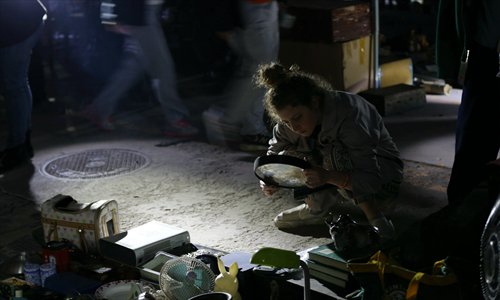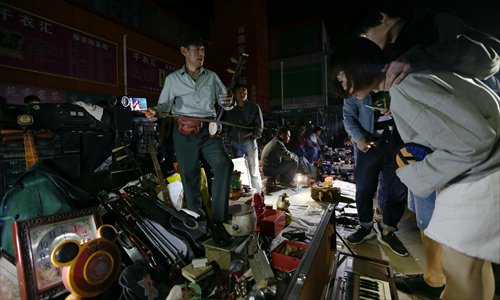Beijing’s Ghost Market
Everything you need to know about the capital’s most mysterious nighttime bazaar

Hannah O'Flynn, a Spanish art student in Beijing, checks out the goods at Beijing's Ghost Market. Photo: Cui Meng/GT
"How much is this piece of shiti (corpse)?" asked Gavin Wang.
"Three hundred," said the seller, who was seated in the shadows, where his face couldn't be seen.
"That's too much. Two hundred."
The two continued to bargain for a few minutes more, before finally settling on 220 yuan ($33.6).
Despite the somewhat menacing-looking scene, this wasn't an illegal black market deal, but just another bargain being made at Beijing's weekly Ghost Market. The item in question this time wasn't an actual corpse; shiti is what some experienced buyers call the dissembled parts of computers, tablets and other electronic devices.
Also referred to as the "night market" (or the early morning market), the weekly bazaar is held every Wednesday from 3 am to around 7 am at the Daliushu Market on East Fifth Ring Road.
It's a strange scene for the uninitiated - hundreds of people wandering around in the dead of night, following the dim glow of their headlamps or flashlights as they bend over to inspect items laid out on the ground.
As you approach, the silence of the night outside of the gate is soon replaced by the rustling sound of people walking around, the clinking of people picking up and putting down all manner of bric-a-brac, ranging from vases to crockery to vintage clocks, and the noise of bargaining. It's a busy scene, yet somehow the tapestry of noise is quieter, more gentle, than the brassy clatter of daytime markets.
Maybe it's the darkness, or the fact that everybody is behaving like experienced buyers by sticking to the rule of observing more than they talk. There's a shadow of solemnity that darkens people's faces.
From books to furniture, from table décor to boom boxes, from jewelry to vintage clothing, you can find literally everything at the Ghost Market. Not only is it cheaper than any department store or daytime market, it embodies a mysterious atmosphere and the silent hope that one might come across something that turns out to be worth a fortune.
Everybody loves a good market. They love the hustle and bustle, the excitement of bargaining, the fact that they can find the most unique items and the possibility of having a great story to go along with them. Take an exclusive tour with Metropolitan around Beijing's trendiest market.



The first rule of the Beijing Ghost Market, located at Daliushu in Chaoyang district, is that he who comes must bring his own source of light - a flashlight or a headlamp. The second rule is that those who seek elusive treasures must arrive no later than 3 am. Finally, newcomers to the market are reminded that each item shall belong to one man only - abandon any treasure that resides in another seeker's hand, returning only when he has laid it back down. Then it shall be yours. Photos: Cui Meng/GT
Midnight wanderers
The "corpse" was the last item that Wang bought that night. It was only around 4:15 am, and the veteran buyer was already in a hurry to leave the market. He had a cheap tote bag full of goods, mostly used computer parts and electronic accessories.
"There's nothing left on this panel board. All that's left is a memory bar that I can use," Wang murmured and left the stall.
Wang, 32, said he buys up these parts at the market "to play with," adding that most of the fun lies in "dissembling two different corpses and using their parts to make a new gadget that works."
Geeks like Wang often show up as early as 3 am. That's when the most experienced buyers come in to snap up the best goods. They are called "the snatchers," according to the seller who sold Wang the computer part, a mid-30s man surnamed Zhang.
In addition to electronic parts, Zhang also sells shoes, old furniture, china, plastic ornaments and even sunglasses.
"At least 3,000 people visited the market tonight," Zhang estimated.
Though this particular market has only been around for a couple of years, ghost markets in general have a long and storied history in Beijing. A well-known version of their origin story traces them to the last days of the Qing Dynasty (1644-1911), when many high-level officials and nobles found themselves down on their luck and began selling family heirlooms to keep themselves afloat. Ashamed of what they had been reduced to, many resorted to selling these items under the cover of night.
It's said that the markets earned their name because some of the items were stolen, fakes or even bought off of tomb raiders. And then there's another reason - seen from a distance, in the dim illumination of fluorescent lamps, the crowds are reduced to hazy outlines that can only be described as ghostlike.
Foreign treasure hunters
Hannah O'Flynn, 22, a Spanish art student at the Central Academy of Fine Arts in Beijing, was one of the few foreigners at the market that night.
"I am very surprised to see so many people here at this time of the day," she said.
With a coffee in hand, she was inspecting the items that her three friends had picked up with interest - the kind of nostalgia-inducing junk that people of a certain generation are familiar with, like game cassettes from the 1990s.
It's O'Flynn's second visit since she was first introduced to the market last year. On that visit, she loaded up on treasures. "Last year I bought a bunch of stuff, little things like posters, vintage shoes, calligraphy works and electronic gadgets," she told Metropolitan.
Her best find was a vintage camera made by Shanghai Seagull Camera, China's oldest camera maker. It's a very early model that uses a reflex mirror on the top to allow the photographer to look down and focus. "It's one of the best things I own," she said.
Originally from Barcelona, a city that itself boasts a rich market culture, O'Flynn is something of a connoisseur of urban bazaars, but said this is the only one she's been to that's held in the dead of the night.
There are several things that drew her to the market. One is that you can buy the Chinese version of all manner of goods, which make good souvenirs, cheaper than you would find elsewhere. And, of course, the fact that the market is open at night adds to its sense of adventure and mystery.
Vendors of the darkness
Wang Chunyong boarded a train in Tangshan, Hebei Province at around 11 pm last Tuesday to make sure that he would arrive at the market by 3 am.
As Wang, who is in his 30s, was unpacking his duffle bag of treasures, and placing them on a piece of cloth spread out on the ground, he said he has been coming to the market for almost a year now.
On the cloth in front of him are laid out pieces of jade jewelry, emerald bracelets, amber beads and porcelain tchotchkes, most of which are priced at several hundred yuan. He collects most of the items in the rural areas nearby his home.
He pays 60 yuan each time for his plot, which is slightly larger than 1 square meter. Two months ago, he said, the price was raised from 50 yuan.
On his best nights, Wang can sell about 1,000 yuan worth of goods. On other nights, he doesn't sell a single piece. It's all about luck.
"It really depends on the market, the economic conditions of the city and the time, and whether people have money lying around. Because these things are mostly for fun, not essentials like food," he said. Wang, a mobile seller, also travels regularly to Tianjin and Qinhuangdao, Hebei Province to peddle his wares at the markets there.
The most valuable thing that he has ever sold at the Ghost Market was a rare porcelain statue of Chairman Mao from the Cultural Revolution (1966-76). It was sold for slightly more than 100,000 yuan.
Wang used to go to another night market that was held on Thursdays at the Baoguo Temple area in Xicheng district, but it was shut down by the authorities in 2011 after 14 years, reported the Beijing Morning Post.
Thanks to recent social media attention, though, more and more of Beijing's hip young vintage enthusiasts are heading to this market each week in hopes of scoring some treasures.
"If you want to come and check out the market, you should come soon," Zhang warned. "If it becomes popular and too many curious people come here, it will be different, or may even disappear."